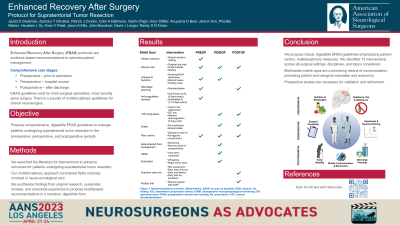Enhanced recovery after surgery protocol for supratentorial tumor resection
Enhanced Recovery After Surgery Protocol for Supratentorial Tumor Resection
Friday, April 21, 2023


Jacob D. Greisman
Medical Student, MS4
New York Medical College
New York, New York, United States
ePoster Presenter(s)
Introduction: Enhanced Recovery After Surgery (ERAS) protocols describe a standardized method of preoperative, perioperative, and postoperative care to enhance outcomes and minimize complication risks surrounding elective surgical intervention. Formal ERAS protocols for cranial procedures first appeared in 2021. To date, standardized guidelines for robust, systematic approaches to examining patient- and provider-based interventions across the preoperative, perioperative, and postoperative setting do not exist, particularly for neurosurgical oncology patients. Furthermore, the potential utility of newer multimedia, app-based communication platforms to facilitate patient education, autonomy, and team communication within the three settings has not been well-described.
Methods: We comprehensively searched PubMed and Google Scholar for literature on interventions associated with positive outcomes after supratentorial tumor resection. We defined the preoperative setting as the time before admission, the perioperative period from admission to discharge, and the postoperative period after that.
Results: We identified modifiable factors pertaining to one or more operative settings influencing patient outcomes. We propose evidence-based recommendations to manage neurosurgical oncology patients with standardized systems.
Conclusion : This review synthesizes recent findings to generate evidence-based guidelines to manage neurosurgical oncology patients with standardized systems and assess the ability of these systems to coordinate multidisciplinary, patient-centric care efforts. Furthermore, we highlight the potential utility of multimedia, app-based communication platforms to facilitate patient education, autonomy, and team communication within each of the three settings. Adopting standardized protocols is necessary to reduce heterogeneity across institutional protocols and facilitate prospective comparative analyses.
Methods: We comprehensively searched PubMed and Google Scholar for literature on interventions associated with positive outcomes after supratentorial tumor resection. We defined the preoperative setting as the time before admission, the perioperative period from admission to discharge, and the postoperative period after that.
Results: We identified modifiable factors pertaining to one or more operative settings influencing patient outcomes. We propose evidence-based recommendations to manage neurosurgical oncology patients with standardized systems.
Conclusion : This review synthesizes recent findings to generate evidence-based guidelines to manage neurosurgical oncology patients with standardized systems and assess the ability of these systems to coordinate multidisciplinary, patient-centric care efforts. Furthermore, we highlight the potential utility of multimedia, app-based communication platforms to facilitate patient education, autonomy, and team communication within each of the three settings. Adopting standardized protocols is necessary to reduce heterogeneity across institutional protocols and facilitate prospective comparative analyses.
